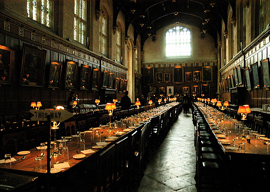
April 19, 2011

“This House would abolish the monarchy” was the resolution to be debated at the Oxford Union on February 3, 2011. I had been summoned to join the team opposing the resolution; thus, I found myself last Candlemas night at Magdalen College.
I refer the uninitiated to Edward Davies’s fine essay, “Alcohol”the Soul of Oxford,” in my collection, The Muse in the Bottle: Great Writers on the Joys of Drinking. Readers” forgiveness for this plug is craved, but Davies’s piece is the best intro I have seen to booze’s place in university life. It is like blood in the body, informing every custom and celebration.
Dining in hall at an Oxford college, all the company is in black tie (plus gowns for the students and faculty), and Latin grace is said. The food is passable but not overly plentiful. The wine, however, seems to pour from an endless fountain. After several rounds, the speaker is escorted to the pre-speech drinks (that which we Yanks call “reception”). Several gins or whiskies later, and the hapless speaker, however inebriated he may be, must put in his appearance before an equally (or more) inebriated audience.
Here is where Oxford’s magic takes hold, for though the audience be somewhat tanked, they are Oxonians after all. They demand that their lecturer make sense. If he cannot answer searching questions intelligently, they will exact an unpleasant price from him in jeers and catcalls. Should he pass through this baptism of bile successfully, they will reward him with an endless round of drinks at an equally endless series of watering holes. So much in life has changed”but in this respect, the Oxford of the Cavaliers and of the Jacobites, of the Chesterbelloc and the Inklings, survives into our time.
Heaven help the lecturer (or debater) who is neither accurate nor amusing, sober or not. Debate at the Oxford Union is conducted along the lines of the House of Commons rather than in the mode familiar to American college debaters. One addresses the president rather than the audience, and proposers face opposers just as the government does the opposition. Union members play MPs and will frequently leap to their feet with points of information or order. It is little wonder that every British PM who has attended Oxford since 1823 has belonged to the Union. It is a splendid preparation for the real thing.
The proposing side had already lost one of four members before the day arrived: Cambridge undergrad and standup comic Ahir Shah had been transferred to the monarchist side after Nadhim Zadawi, the new Tory MP for Stratford-on-Avon, had to drop out. His place was taken by student (and Union member) James Freeland. The remainder were Louise Christian, civil-rights lawyer and Guardian stalwart; Graham Smith of the Republic website; and Tom Freda, Anglophone spokesperson for Citizens for a Canadian Republic.